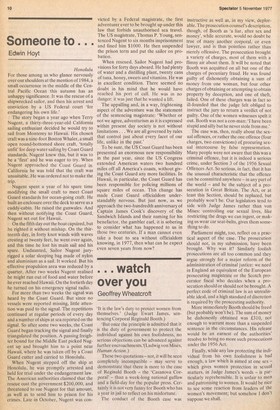. . . watch over you
Geoffrey Wheatcroft
'it is the law's duty to protect women from themselves.' (Judge Ewart James, sentencing Corporal Reginald Booth.) 'But once the principle is admitted that it is the duty of government to protect the individual against his own foolishness, no serious objections can be advanced against further encroachments.'(Ludwig von Mises, Human Action.) These two quotations— not, it will be seen completely incompatible — may serve to demonstrate that there is more to the case of Reginald Booth — the 'Casanova Corporal' — than a week-long national guffaw and a field-day for the popular press. Certainly it is not very funny for Booth who has a year in jail to reflect on his misfortune.
The conduct of the Booth case was instructive as well as, in my view, deplorable. The prosecution counsel's description, though, of Booth as 'a liar, after sex and money', while accurate, would no doubt be true of many another corporal, or even lawyer, and is thus pointless rather than merely offensive. The prosecution brought a variety of charges, most of them with a flimsy air about them. It will be noted that Booth was acquitted on all but one of the charges of pecuniary fraud. He was found guilty of dishonestly obtaining a sum of money from one woman, but four other charges of obtaining or attempting to obtain property by deception, and one of theft, failed. One of these charges was in fact so ill-founded that the judge felt obliged to instruct the jury to return a verdict of not guilty. One of the women witnesses spelt it out. Booth was not a con-man: have been stupid and silly but he never stole from me.'
The case was, then, really about the sexual offences, or rather the one offence (four charges, two convictions) ot procuring sexual intercourse by false representation. Many people were not aware that this was a criminal offence, but it is indeed a serious crime, under Section 3 of the 1956 Sexual Offences Act. So serious, in fact, that it has the unusual characteristic that the offence can be committed anywhere — in any part of the world — and be the subject of a prosecution in Great Britain. The Act, or at least this Section, should be replaced, but probably won't be. Our legislators tend to side with Judge James rather than von Mises: controlling our sexual lives, like restricting the drugs we can ingest, or making us wear car seat-belts, gives them something to do.
Parliament might, too, reflect on a practical aspect of the case. The prosecution should not, in my submission, have been brought. Why was it? Similarly foolish prosecutions are all too common and they argue strongly for a major reform , of the administration of criminal justice: we need in England an equivalent of the European prosecuting magistrate or the Scotch procurator fiscal who decides when a prosecution should or should not be brought. A perfect code of criminal law is an unrealisable ideal, and a high standard of discretion is required by the prosecuting authority.
More immediately Booth should be freed (but probably won't be). The sum of money he dishonestly obtained was £310, not enough to warrant more than a suspended sentence in the circumstances. His release would be an earnest of the authorities' resolve to bring no more such prosecutions under the 1956 Act.
Finally, While any law protecting the individual from his own foolishness is bad enough, a law which is aimed at one sex — which gives women protection in sexual matters, in Judge James's words — is particularly reprehensible. It is unfair to men and patronising to women. It would be nice to see some reaction from leaders of the women's movement; but somehow I don't suppose we shall.


































 Previous page
Previous page